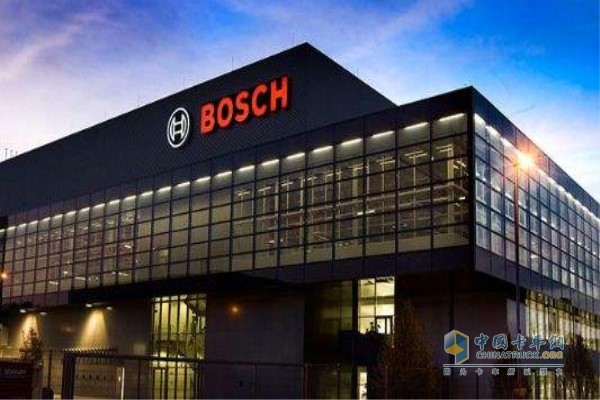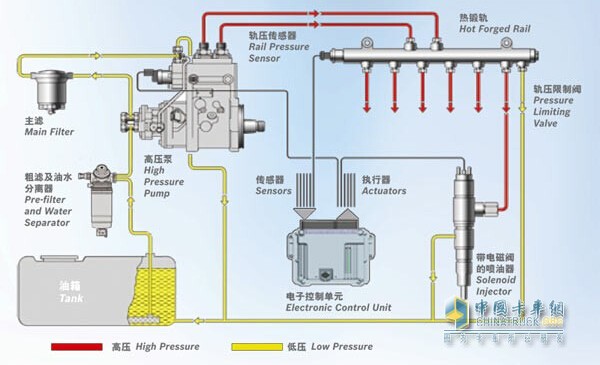[Hanover] Good performance of commercial vehicle business, sales growth of Bosch Automotive and Intelligent Technology business
The logistics industry is facing a series of major challenges. Climate protection, air pollution, urbanization, and driver shortage have all become urgent problems. However, this situation will intensify and it is estimated that by 2040, road freight volume will increase by another 50% (source: Shell). Dr. Bulander pointed out: “To maintain growth in road freight transportation, the most important issue to be solved by current traffic regulations is how to minimize its negative impact on the environment, people and the road network.†Bosch has some technical solutions. Not only in the specific product itself, but also in connected services outside the vehicle. “We want trucks to carry weight, not to increase the burden,†Bulander added. Through the development of “three-way†technology for electrification, automation and interconnection of commercial vehicles, Bosch is committed to realizing the vision of zero-emission, zero-accident and zero-worry for future road freight transportation. From internal combustion engines to fuel cells: Bosch gives new power to powertrains For Bosch, significant improvements in the overall efficiency of commercial vehicle powertrain systems, thereby reducing fuel consumption and reducing carbon dioxide and nitrogen oxide emissions, are milestones. To achieve this goal, Bosch is actively developing a new generation of diesel and alternative power solutions. Bulander said: "In the next few years, the development of commercial vehicle powertrain systems will involve multiple disciplines. We will open up ideas on the technology path and gradually achieve electrification goals." By 2025, 80% to 90% of trucks will be carried Diesel engines; in 2030, one quarter of commercial vehicles worldwide will be powered by electricity. This ratio is likely to be higher in China, reaching one-third. “No one will abandon alternative fuels for companies that have high hopes for the future heavy-duty truck market. This technology uses renewable energy to generate electricity, also known as synthetic fuels,†Bulander added. Bosch's goal is to become a leader in the field of electric mobility in the international market. To this end, Bosch offers targeted solutions to meet different needs and offers a wide range of commercial vehicle electrification technology solutions, such as a 36 volt power pack for freight electric bicycles, a bridge for vans, and The fuel cell power system provided by a 40-ton truck, which was developed by Bosch in cooperation with the US startup Nikola Motors. In addition, Bosch has established a strategic partnership with China's commercial vehicle engine manufacturer Weichai Power to jointly promote the development and application of fuel cells. Bosch not only ensures electric drive for new cars, but also provides electric vehicle retrofit solutions through the integration of bridges and semi-trailers, generating electricity during braking and providing power to the trailer's power unit. Taking a refrigerated trailer as an example, the calculations show that Bosch's solution can help save up to 10,000 euros per year. Bosch promotes automated truck driving In addition to commercial vehicle electrification, another major growth area is commercial vehicle automation. In the next decade, the market size in the field of electrification and automation will show double-digit growth. Bosch believes that the driver assistance system is an important step in achieving automated truck driving. In the event of a traffic accident in a truck, the risk of casualties is twice as high as that of a passenger car. For Bosch, this alone is enough to drive the truck's driver assistance system. These systems can alleviate the burden on truck drivers and make roads safer. Steering warnings, blind spot identification, and predictive emergency braking systems all help prevent truck accidents. At the same time, Bosch also provides the necessary radar sensors and other products for the system. Automated driving of commercial vehicles can also solve other challenges facing the transportation industry. In the United States, for example, there are still 50,000 truck driver gaps in the United States; ten years later, this number may rise to three times and will reach 150,000. Europe is also facing a similar situation. In response to this challenge, Bosch saw the tremendous development potential of commercial vehicle autopilots between hubs, with unmanned trucks being able to travel between stations. This technology can simultaneously solve many problems faced by the transportation industry and improve the profitability, transportation volume and safety of logistics companies. Bosch believes that the driverless team represents the direction of the next automation. This technology not only reduces labor costs but also reduces fuel consumption. But it also means that stricter requirements must be met in terms of legislation, technology and infrastructure. To this end, Bosch is participating in several major research projects in this field in Europe. Bosch digital internet logistics solution to achieve point-to-point service from highway to home Bosch believes that interconnection means a more efficient transportation system that can alleviate road congestion and logistics companies will benefit from it. For the future logistics industry, Bosch has two technical expertise: one is extensive expertise in commercial vehicles and the other is deep Internet of Things expertise. Dr. Markus Heyn, member of the Bosch Group's board of directors and head of the commercial vehicle business, said: "Bosch can realize digital Internet logistics solutions from the highway to the doorstep." Today in Europe and the United States, almost every new truck is connected to the Internet. In this context, Bosch provides trucking platforms for truck manufacturers, enabling software upgrades or predictive diagnostics, as well as new services in the field of connected services. At this point, Bosch's service center is using a sensor system that monitors the transportation and delivery of critical goods, including life-critical plasma. Each year, the control center monitors the transportation of nearly 40,000 trucks carrying valuable cargo. Bosch also uses the Internet of Things to automate shipment tracking. Sensors on goods and containers transmit information such as location, temperature and vibration to the cloud. Initial experience in this area shows that these real-time logistics solutions can significantly reduce dispatcher analysis and inventory time by more than 50%. In addition, the availability of reusable containers has increased by 30%. Bosch hopes that interconnection will improve the transportation rate of road freight and reduce the burden of road network. Heyn said: "Through electrification, automation or interconnection, Bosch solutions are helping road freight to break through limits and achieve sustainable development." Carbon Steel Flange,Carbon Steel Pipe Flanges,Carbon Steel Blind Flanges,Carbon Steel Forged Flanges Shandong Zhongnuo Heavy Industry Co.,Ltd. , https://www.zhongnuoflange.com Bosch Group
Bosch Group  Bosch
Bosch